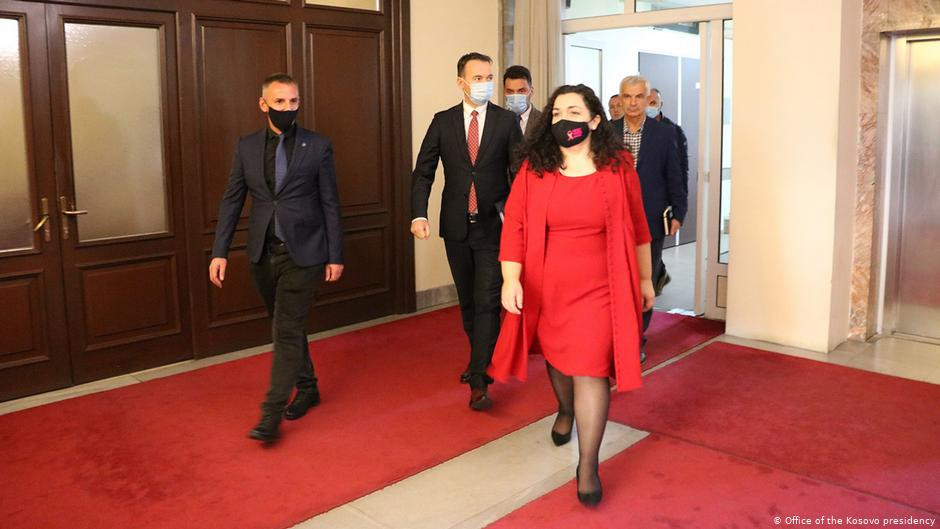Trump sought to engage with Pristina-Belgrade dispute but interventions seen as serving narrow American interests
Valerie Hopkins in Budapest 5 HOURS AGO
Kosovo expects its relations with the US to improve with the election of Joe Biden, after decades of key American support was thrown into doubt under the Trump administration, the Balkan country’s acting president has said. “Everyone knows that president-elect Biden is not just any friend of Kosovo,” said Vjosa Osmani in an interview with the Financial Times, referring to Mr Biden’s long support for intervention and dialogue between Serbia and its former breakaway province of Kosovo. “He knows our pain very well.”
Ms Osmani assumed the role of acting president in early November after her predecessor, Hashim Thaci, resigned to face war crimes charges brought by a special Hague-based court. After a brutal war that followed the disintegration of the former Yugoslavia, the US has long played a key role in relations between Serbia and Kosovo.
While Mr Trump sought to engage, some saw his interventions as serving narrow US economic and political interests. “Joe Biden knows the truth, and the truth is very plain and simple,” Ms Osmani said. “Serbia lost Kosovo because it abused the principle of sovereignty and territorial integrity to kill the people that lived in that territory, to commit attempted genocide, war crimes and crimes against humanity. He knows the truth and he will not try to change the truth.”
As a US senator, Mr Biden was a vocal advocate of American intervention in the 1998-99 Kosovo war, in which the Kosovo Liberation Army waged a guerrilla insurgency against forces loyal to Slobodan Milosevic. But while the majority of crimes committed by Serb forces, allegations of war crimes have also dogged members of the KLA, many of whom moved into politics.
The expected approach of a future Biden administration contrasts with the efforts of the Trump administration to broker a quick deal between the leaders of Kosovo and Serbia. However, rather than putting bilateral disputes between Belgrade and Pristina at the centre, the focus of the agreements was on US foreign policy priorities, such as recognising Jerusalem as the capital of Israel and promising not to give 5G licences to “untrustworthy” companies — widely believed to be an allusion to Chinese tech company Huawei.
In the spring, Washington encouraged the ousting of an anti-corruption government in Kosovo because its premier was not interested in the direction of negotiations with Serbia being pushed by the Trump administration. And in September, after a change in government in Pristina, Donald Trump hosted Serbian president Aleksandar Vucic and Kosovo premier Avdullah Hoti in the White House, where both parties agreed to improve economic relations.
An image of Vjosa Osmani at a bus stop in Pristina © Armend Nimani/AFP/Getty
That deal may be never implemented, however. “We can’t just move on . . . without looking at what is the position of the new administration on those points,” Ms Osmani said, referring to a commitment to share sovereignty over a lake that straddles the border and a “mini-Schengen” agreement with Serbia.
Kosovo declared independence from Serbia in 2008 but has yet to be recognised by Belgrade, or by key powers including Russia and China.
Referring to the resignation of Mr Thaci, Ms Osmani said that her country had shown an “institutional maturity” and “an extraordinary will to co-operate with justice”. Prosecutors allege Mr Thaci, as a commander of the guerrilla KLA, and others were responsible for almost 100 murders, including of minority Serbs, Catholics and Roma as well as of political opponents, during and immediately after the war. Last Monday, Mr Thaci pleaded not guilty to 10 charges of war crimes and crimes against humanity.
Mr Thaci is an ethnic Albanian. The Hague-based court, which is part of Kosovo’s judicial system but staffed entirely by internationals owing to fears about witness protection, is contentious in the small Balkan country of 1.8m, because it focuses solely on crimes committed by ethnic Albanians, who today comprise about 90 per cent of the population. However, most of the people who died in the war were ethnic Albanians.
The indictment was announced in June, as Mr Thaci was travelling to a planned White House summit with his Serbian counterpart, Mr Vucic, and confirmed by a judge in November. Ms Osmani said there could be “no moral equivalence” between the crimes allegedly committed by some Kosovar individuals and the “state apparatus of Serbia”. She said previous judicial attempts to hold Serbian military and political leaders to account for wars on the territory of former Yugoslavia had come up short.

